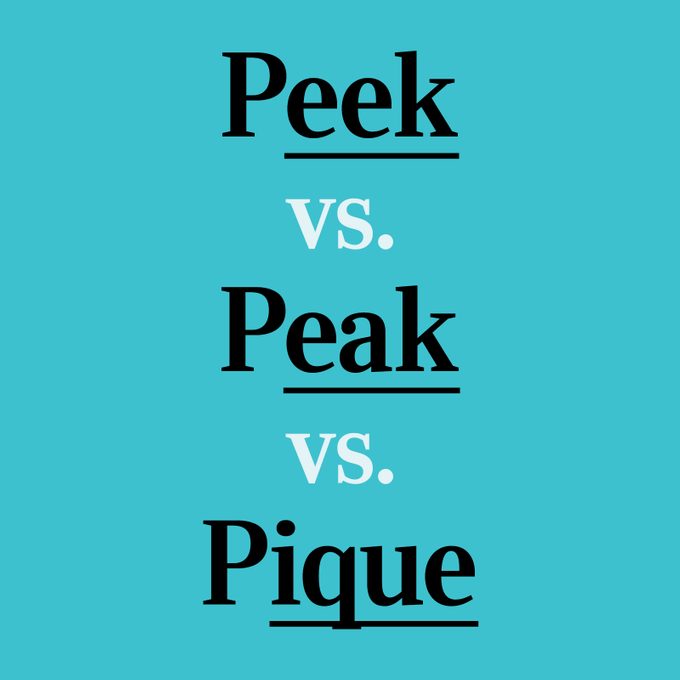Not sure when to use peek vs. peak? Or where pique fits into this at all? We've got the grammar answers you need.

“Peek” vs. “Peak” vs. “Pique”: How to Use Them the Right Way

Is it OK to take a peek at that diary hidden in the sock drawer? Or should you take a peak? Understanding when to use peek vs. peak can be tricky—and, for that matter, when to go with pique. Like stationary and stationery, peek, peak and pique are homonyms, words that sound similar, have different meanings and completely confuse most of us.
The ever-confounding English language often swings with just a letter or two. In this case, peek vs. peak have distinctly different meanings. And the word pique has another etymological heritage entirely. When you say these words aloud, there’s nothing to worry about. But when you’re writing them, you need to be precise so you don’t make an embarrassing grammar mistake.
Since parsing pronunciation and grammar has always piqued my interest, I dove into the details. Read on for a rundown on how to use these three words.
Get Reader’s Digest’s Read Up newsletter for more grammar, cleaning, travel, tech and fun facts all week long.
What does peek mean?
The 14th-century English peek means to take a look, sometimes in a furtive manner to avoid detection. It can be used as a noun, as in “a quick peek,” but peek is also a verb.
According to Merriam-Webster, peek derives from the Middle English term piken. And as the Oxford English Dictionary points out, the verb first appeared in 1390, in the manuscript Roberd of Cisyle. Historically, peek had two synonyms: keek, which lasted until the 15th century, and peep, which we still use today.
Did you note the double e in every iteration? They are just like two eyeballs shifting surreptitiously. It’s a good visual for remembering that peek means “to look furtively.”
Examples of peek in a sentence
- The actor was able to get a quick peek at the exclusive interview before it went live on the website.
- The CEO gave us a sneak peek at the upcoming product launch during the meeting today.
- I couldn’t resist taking a peek at the new movie trailer—it looks amazing!
What does peak mean?

The word peak suggests both the top of a mountain and the height of an accomplishment. Merriam-Webster’s definition includes “the top of a hill or mountain ending in a point” and “the highest level or greatest degree.”
This noun dates back to the 15th century—the earliest use, according to the Oxford English Dictionary, was in about 1450, in the De Re Militari of Vegetius. The verb form wouldn’t make an appearance until the late 1800s. And in modern usage, it can also be used as an adjective, as in “peak performance.”
Examples of peak in a sentence
- Although the artist is 72 years old, the volume and quality of his work show he’s at the peak of his career.
- Sales are expected to peak during the holiday season, so we’re preparing for a significant increase in demand.
- I think I’ve hit my peak in terms of fitness—now I just need to maintain it!
What does pique mean?
The word pique doesn’t look the same as the other two, so you’re less likely to confuse peek with pique or peak with pique, although all three are pronounced the same.
Unlike peek and peak, which have English origins, pique has French roots. Originally, the verb piquer meant “to prick or irritate,” and just about every iteration of this word in the romance languages (Italian, Spanish, Portuguese, etc.) traces back to something sharp or a way to puncture.
As a verb, it can mean “to irritate” or “provoke anger,” and it often indicates a quick response to a perceived slight, as opposed to simmering anger. However, pique doesn’t always carry a negative connotation. In fact, the most common use of the verb today relates to provoking or arousing someone’s curiosity.
The noun form of the term clearly traces back to the French piquer: It means “a brief feeling of resentment.”
Examples of pique in a sentence
- After I shared an idea with a colleague, it piqued his interest in supply-chain issues.
- Never laugh at a toddler in a fit of pique; it may make matters worse.
- Reading a historical novel about the Civil War piqued his curiosity about the Deep South.
Tricks for remembering peek vs. peak vs. pique
This trio is a classic example of commonly confused words in English. The tips here should be helpful if you’re a person who fears grammatical mistakes that make you look bad.
When in doubt about properly using peek vs. peak, think about the vowels. One easy way to remember is that peAk looks like it has a mountain in the middle. If all else fails, recall the common game we play with babies: peek-a-boo. It is a game of hiding your eyes, and those double e’s look like squinting eyes.
On the other hand, pique is in a different category. So thinking about the French ending can help you remember that the noun usage of the word suggests a soupçon of emotion.
Why trust us
At Reader’s Digest, we’re committed to producing high-quality content by writers with expertise and experience in their field in consultation with relevant, qualified experts. We rely on reputable primary sources, including government and professional organizations and academic institutions as well as our writers’ personal experiences where appropriate. We verify all facts and data, back them with credible sourcing and revisit them over time to ensure they remain accurate and up to date. Read more about our team, our contributors and our editorial policies.
Sources:
- Merriam-Webster: “Peek”
- Oxford English Dictionary: “Peek”
- Merriam-Webster: “Peak”
- Oxford English Dictionary: “Peak”
- Merriam-Webster: “Pique”























